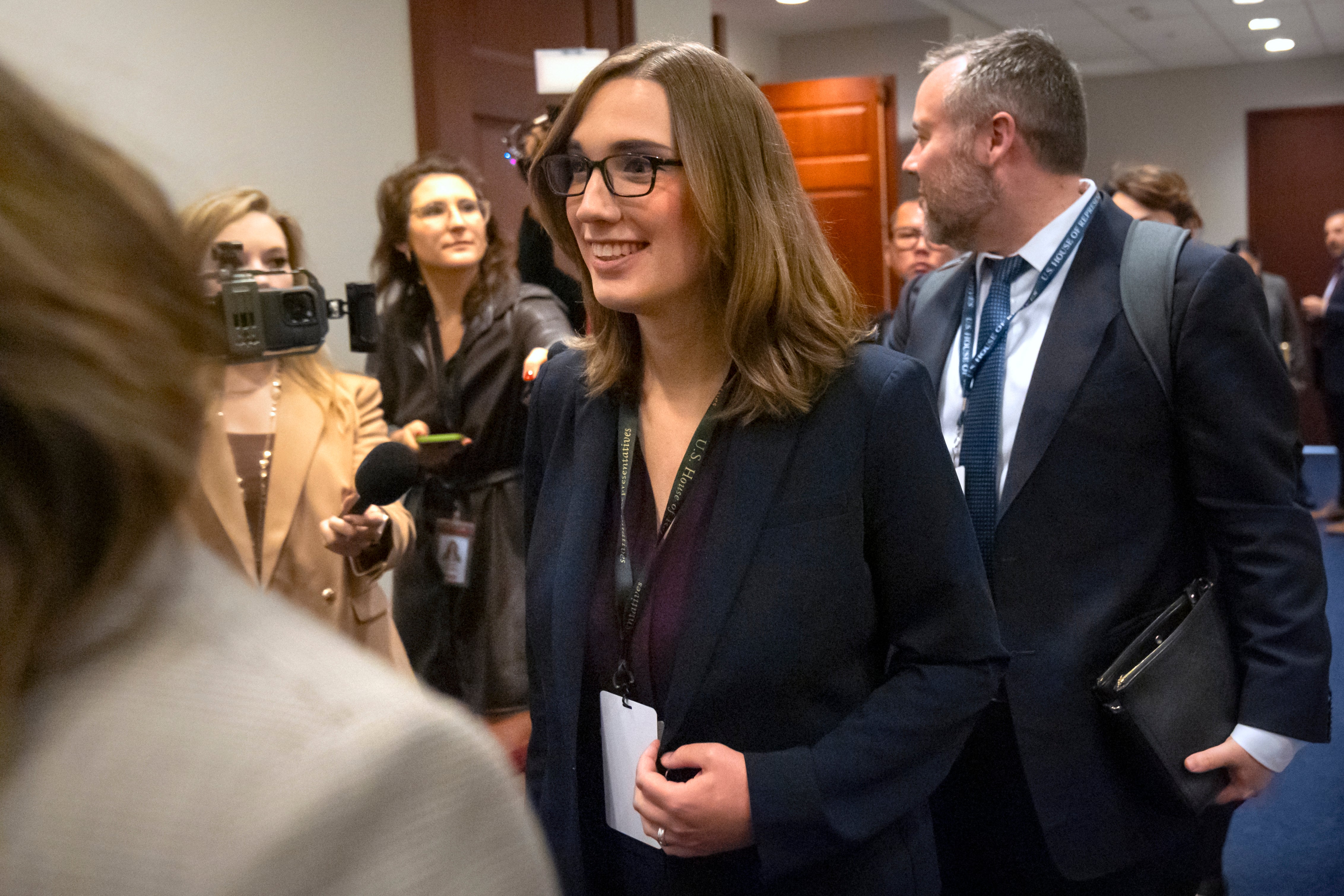Trump’s blitz of anti-trans ads probably worked – but not for the reason you might think
Republicans spent at least $215 million on attack ads about transgender rights. The question is, did it actually move voters?

Gabrielle Ludwig of Reno, Nevada was not blindsided when images of herself playing basketball 12 years earlier at community college suddenly appeared on her TV screen during the ad break in a Philadelphia Eagles.
That's because friends and co-workers across the country had already tipped off the 62-year-old that she was one of several transgender Americans unwillingly conscripted into a massive Republican advertising blitz, depicting Democrats as woke extremists for supporting trans rights.
"I was hoping it would just go away," Ludwig told The Washington Post in an interview. "But it snowballed. It got bigger and bigger every hour."
According to data from the ad tracking firm AdImpact, Republicans spent a total at least $215 million on anti-trans TV ads at various levels of politics, with the most prominent coming from the Trump campaign itself.
"Kamala is for they/them. President Trump is for you," Trump's ads declared, highlighting a 2019 interview where Harris backed taxpayer-funded sex reassignment surgery for trans people in federal prisons.
These ads were central to Trump's electoral strategy. During one fortnight in October, journalist Erin Reed calculated that his campaign spent more on messages about trans rights than housing, immigration, and the economy combined.
Consequently, Trump's victory has set off a fiery debate among Democrats over whether they should take a more conservative stance on trans rights.

But did the ads actually work? That is, in an election where high consumer prices and an unpopular incumbent provided major tailwinds to any opposition candidate, were voters actually moved by this specific issue?
The answer appears to be that they probably did – but not because Americans are actually very angry about trans rights. Instead, Trump was able to tie that issue implicitly to other things voters care more deeply about.
"I don't think it was the primary factor in Trump's victory, but I do think it was a contributing factor," David Wasserman, senior editor and elections analyst for the Cook Political Report, tells The Independent.
"I would argue that the immigration issue was probably second behind the economy, and then the trans attacks were probably third in terms of their role."
The numbers are a little murky
Quantitative evidence for the ads' effectiveness is mixed, and each study so far has an asterisk beside it.
According to The New York Times, the pro-Harris super PAC Future Forward found that one of Trump's "they/them" spots shifted the race 2.7 points against Harris after viewers watched it. But the Times gave no further details of this study, and the notoriously reclusive Future Forward did not respond to questions from The Independent.
Meanwhile, research by Ground Media and GLAAD found that the ads "yielded no statistically significant shift in voter choice, mobilization or likelihood to vote", though the ads made viewers more negative towards trans people in general. However, that research was published on October 24, meaning anything that changed in the last 12 days of the campaign would not have been counted.
Change Research, a Democrat-leaning polling firm, also studied these ads in eight battleground states, and found they did not lead to any lead to a shift in voting intention. Unfortunately,the firm only looked at ads in Senate races, and did not include Trump's flagship anti-Harris messages.
The ads may have hit harder in some states than others. Strategists on both sides in Texas told Houston Public Media that they boosted Republican turn out, with one GOP operative calling them "wildly successful".

"We'll probably never know what the exact impact was," says Wasserman. "However, the time that Trump began airing these attack ads, in late September and early October, was roughly the time when Kamala Harris's favorability began to reverse or recede.
"I do think Trump's paid communication played a role in that, and his paid communication was much more effective than his rally appearances or impromptu ramblings, which often went off the rails."
So does that mean American voters have turned against trans rights? Well... not exactly.
‘It was a symbol, a very effective symbol’
A few days after the election, the Democratic polling firm Blueprint released a widely-shared report that appeared to suggest that trans rights were a major factor costing Harris the election.
"Kamala Harris is focused more on cultural issues like transgender issues rather than helping the middle class" was the single top reason given by both swing voters in general and swing voters who chose Trump for rejecting his Democratic opponent.
"It was a symbol, a very effective symbol," Alyssa Cass, a partner at Blueprint's parent outfit Slingshot Strategies, told HuffPost. "So I think it was very effective in reminding voters that the Democratic Party has moved to a place that you can’t recognize in yourself and your friends and your family."
Putting aside the fact that many Americans have trans people among their friends and family, this result may not be all that it seems. Polling results can be very sensitive to the phrasing of each question, and Blueprint's poll explicitly framed "transgender issues" in opposition to "helping the middle class", while also making trans issues emblematic of all "cultural issues". No other option Blueprint showed to swing voters used this kind of language.
Another Democrat-aligned research firm, GQR, put "opposing transgender surgeries and transgender kids in sports" – a more specific and neutral phrasing – "dead last" among issues cited as most important by American voters, with only 4 per cent placing it first compared to 35 per cent for "improving the economy".
Polling by Gallup from before the election backs up the idea that trans issues are not that important to most voters, with "transgender rights" ranked the least important issue ("the economy" and "democracy in the US" were at the top).
Overall, polls tend to show that cisgender (or non-trans) Americans are broadly supportive of basic trans rights such as access to medical care and protection from discrimination. They get warier when it comes to specific controversial issues, such as trans women competing in women's sports or medical care for trans people in prison.
All prisoners have a legal right to necessary medical care under the U.S. Constitution’s Eighth Amendment, and some federal courts have ruled that this can include transition surgeries.

Nevertheless, Wasserman argues that Democrats shouldn't kid themselves about the fact that some progressive stances on trans rights are genuinely unpopular.
"Most American voters recoil at the idea of their taxpayer dollars going to gender reassignment surgery for federal inmates," he says. "Until public opinion shifts further, Democrats are going to have to meet voters where they are, not where Democrats wish they were.”
At the same time, he adds that the issue "ranks very low" on most voters' priorities. So what made Trump’s ads effective?
How Trump tied transgender basketball to the price of milk
To understand this, think back to that Blueprint poll that juxtaposed trans rights against "helping the middle class". This is exactly the contrast that Trump's ads sought to draw.
Harris, the ads claimed, is for "they/them" – a nebulous, confusing transgender other – while Trump is "for you". When the narrator said the second part, you’d see headlines suggesting Trump would improve the economy – often with economics-y video clips such as men in hard hats in a factory.
According to Wasserman, undecided voters in thet 2024 election largely had "very negative views of both candidates". They saw Harris as too liberal to be an effective president and Trump as too erratic – but tended to believe that Trump would handle the economy better.
"Fundamentally this was a cost of living election," says Wasserman. "However, Trump did a very effective job of reinforcing voters' concerns about Harris's liberalism... cultural issues and economic ones both played a role in weaving that narrative."
In other words, the key to these ads' appeal was in linking trans rights to the issues voters care about most, targeting one of Harris's biggest vulnerabilities while buffing Trump's image by contrast.
There is, though, something curious about this picture.

The implicit premise of Trump's ads – that trans rights are a distraction from serving the needs of the majority – isn’t actually too far away from Democrats’ regular talking point that Republican attacks on trans people are a “distraction” from “the real issues”.
Though they differ sharply in their actual policies, both parties agree that trans issues are marginal to American politics. And yet, paradoxically, trans people remain right in the middle of the battlefield.
As well as being a top advertising priorities for the Trump campaign, they were among the first groups congressional Republicans targeted after the election – and among the first segments of the progressive coalition that right-leaning Democrats suggested abandoning.
So are trans rights marginal or central? Trans scholars, activists, and journalists have increasingly argued the latter.
Take feminist philosopher Judith Butler, who contends in their most recent book that fear and disgust of transness has become one of the primary fuels for authoritarian politics around the world. Or ACLU staffer Gillian Branstetter, who has described misogyny against trans women as "one of the most powerful political forces in the world."

Similarly, historian Jules Gill-Peterson has described the GOP's new war on trans life as an attempt to build a "cisgender state", which in turn serves as a "strategy" for strengthening government control over all kinds of people.
Either way, Wasserman says the apparent success of Trump's ad campaign requires hard thinking from his opposition.
"Democrats have not effectively articulated where they stand on these wedge issues... but now they've learned the hard way that letting those attacks go unanswered was detrimental to their cause."
Join our commenting forum
Join thought-provoking conversations, follow other Independent readers and see their replies
Comments
Bookmark popover
Removed from bookmarks